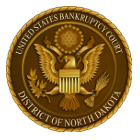FAQs
-
How much do I have to pay for each installment?
The Notice and Service Requirement List made applicable by D.N.D. Bankr. L.R. 2002-1 requests a first installment payment of $100 at the time of filing or within 14 days.
-
I'm filing my bankruptcy case without an attorney, can I pay my filing fee by check? What about with a credit card?
The only acceptable forms of payment by debtors for filing fees are cashier's check, money order, or cash.
-
If I don't complete the required financial management training, will I still receive my discharge?
No. If you are an individual debtor in a Chapter 7 or Chapter 13 case, you are required to complete financial management training before the court will enter a discharge in your case.
-
If my case gets dismissed, or I change my mind about filing, will my filing fee be refunded?
No. By statute, filing fees cannot be refunded.
-
What are claims? How are claims filed?
In the broadest sense, a claim is any right to payment held by a person or company against the debtor(s) and the debtor's bankruptcy estate. A claim does not have to be a past due amount but can include an anticipated sum of money which will come due in the future.
The written statement filed in a bankruptcy case setting forth a creditor's claim is called a proof of claim. Under the Federal Rules of Bankruptcy Procedure, with limited exceptions, claims filed by creditors, except governmental units, must be filed within ninety (90) days after the first date set for the meeting of creditors. Claims of governmental units must be filed within one hundred eighty (180) days of the date the petition was filed.
-
What are Local Rules? How do I get a copy of them
Local rules are rules that govern practice in the bankruptcy court in North Dakota in addition to the Federal Bankruptcy Rules. ND Local Rules can be obtained from the clerk's office or you may download them from this site for free.
-
What are the benefits and features of using ECF?
There are a number of significant benefits and features.
Registered attorneys are able to file documents with the court 24 hours per day, 7 days per week. Complete case information is available to attorneys, parties and the general public through the Internet. This includes the ability to view the full text of all filed documents on the system and the option of receiving notices electronically in ECF cases. The out-of-pocket cost of participation for attorneys is typically very low, and there are no additional fees charged by the court for users of this service. -
What are the consequences of filing for bankruptcy?
Depending on a debtor's financial situation and reasons for filing, the consequences of filing for bankruptcy protection may outweigh the benefits. The following information is intended as a summary only. You are strongly encouraged to consult with an attorney in order to determine the rights and obligations that apply to your individual situation. Those considering bankruptcy should be aware of the following:
- Not all debts are dischargeable. Ex: Secured creditors retain some rights which may permit them to seize property, even after a discharge is granted. Spousal and child support obligations and most tax debts are not dischargeable.
- Within 14 days of the filing of a bankruptcy petition, schedules of the debtor's assets and liabilities must be filed. Failure to timely file the appropriate schedules may result in dismissal of the bankruptcy case.
- If a case is not dismissed and a discharge is entered by the court, the debtor is prohibited from being granted another discharge under Chapters 7 and 11 within eight years.
- Fraudulent information or acts by the debtor are grounds for denial of a discharge and may be punishable as a criminal offense.
-
What are the federal holidays?
- New Year's Day
- Martin Luther King, Jr.'s Birthday
- President's Day
- Memorial Day
- Independence Day
- Labor Day
- Columbus Day
- Veteran's Day
- Thanksgiving Day
- Christmas Day
-
What can I do if a creditor keeps trying to collect money after I have filed bankruptcy?
If a creditor continues to attempt to collect a debt after the bankruptcy is filed in violation of the automatic stay, you should immediately notify the creditor in writing that you have filed bankruptcy. Provide them with either the case name, number, and filing date, or a copy of the petition that shows it was filed. If the creditor still continues to attempt to collect, the debtor may be entitled to take legal action against the creditor to obtain a specific order from the court prohibiting the creditor from taking further collection action, and if the creditor is willfully violating the automatic stay, the court can hold the creditor in contempt of court and punish the creditor by fine or incarceration. Any such legal action brought against the creditor will be complex and will normally require representation by a qualified bankruptcy attorney.
